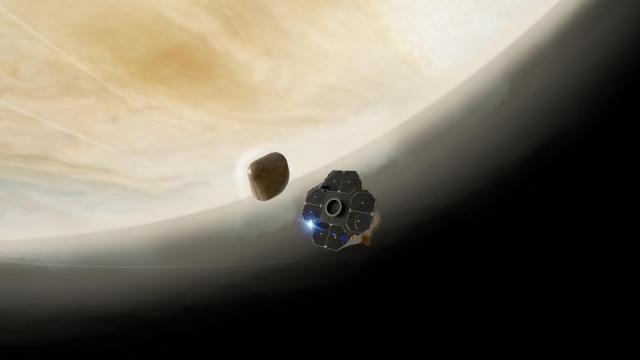SpaceX might have its sights set on Mars, but Rocket Lab is seeking to become the first private company to reach Venus and explore its clouds for signs of potential habitability.
Rocket Lab revealed new details about its self-funded mission to the Venusian clouds in a recent paper published in the journal Aerospace. The California-based company is building a small probe that’s designed to fly through the planet’s upper atmosphere for a duration of roughly five minutes and at altitudes between 29 and 37 miles (48 to 60 kilometers) above the surface. The company is hoping to launch its spacecraft in May 2023 and have the probe reach Venus in October of that same year, with a backup launch window in January 2025.
The probe is designed to fly aboard the company’s trusty Electron rocket — the “only reusable orbital-class small rocket” currently in existence, according to the company. Electron will send the probe on a 100-mile (165-kilometre) orbit above Earth; then, the rocket’s high-energy upper stage Photon will perform a series of burns to raise the probe’s orbit to where it can achieve escape velocity from Earth’s gravitational pull.
Rocket Lab is no stranger to audacious feats; the company pulled off a daring stunt in May by using a helicopter to catch a falling rocket mid-air. Sending a probe to Venus, however, is a major step beyond, as the second planet from the Sun is located some 38 million miles (61 million kilometers) from Earth at its nearest proximity. It’s closer to Earth than Mars, but Venus is far less welcoming of spacecraft due to its extremely hot atmosphere and air pressure that’s 90 times higher than that of Earth’s.
A mission like this to Venus would signal a new era of planetary exploration, in which private companies, and not just government space agencies, make attempts to explore distant bodies. Rocket Lab is also slated to launch twin spacecraft to Mars in 2024 as part of a subcontract with the University of California Berkeley Space Sciences Laboratory. Two other private space companies, Impulse Space and Relativity Space, recently announced a joint venture to launch a mission to Mars as early as 2024.
Rocket Lab’s self-funded science mission sounds noble, and possibly even important, but there’s more to this mission than sniffing the Venusian atmosphere for possible biosignatures. It’s possible that Rocket Lab is using the mission to test its spacecraft in anticipation of national space agencies, like NASA or the European Space Agency, wanting to further outsource similar projects. And as the Rocket Lab study points out, the mission will also put its Photon spacecraft to the test and demonstrate the success of a “high-performance, low-cost, fast-turnaround deep space entry mission delivering Decadal-class science with small spacecraft and small launch vehicles.” Though not stated in the study, this technology could eventually be leveraged to support commercialized supply chains (or other linkages) between celestial bodies, such as supporting colonists on Mars. Rocket Lab also wants to initiate a campaign of smaller missions to explore Venus, the paper says.
NASA hasn’t sent a dedicated probe to Venus since the Magellan program, which arrived at the planet in 1989 and wrapped up science operations in 1994. That is set to change later this decade, as NASA’s DAVINCI mission is scheduled to launch to Venus in 2029. The probe will plunge through Venus’ atmosphere prior to landing on its surface. DAVINCI is one of three upcoming Venus missions, as Venus is very hot right now, both literally and figuratively.
Indeed, Venus boasts temperatures that reach up to 880 degrees Fahrenheit (471 degrees Celsius), while featuring a thick, carbon dioxide-rich atmosphere and a volcanic landscape. The planet is not fit for habitability today, but scientists believe it may have started off with similar conditions to Earth and over time became the hellish world it is today.
In September 2020, a group of scientists claimed that Venus may have signs of life in its clouds based on a detection of what might be phosphine in the Venusian atmosphere. Phosphine is considered a biosignature gas on Earth. That’s the main driving force behind Rocket Lab’s mission to Venus — to help gather further evidence of potential life in the Venusian clouds. “We’re sending our Photon spacecraft to Venus in search of life,” Rocket Lab wrote on Twitter. However, the phosphine detection was largely met with scepticism, with scientists raising doubts over the data, among other quibbles.
Rocket Lab’s search for life in Venus’ clouds may turn up empty, but a mission to the planet’s atmosphere could answer key questions about its past. A 2019 study from NASA’s Goddard Institute for Space Studies suggested that Venus may have once had oceans on its surface for about 2 to 3 billion years, indicating potentially habitable conditions during its early history. Either way, and should Rocket Lab successfully make it to Venus, it’ll set a new standard for private space ambitions.
More: NASA’s DAVINCI Mission Will Plunge Through the Hellish Atmosphere of Venus
